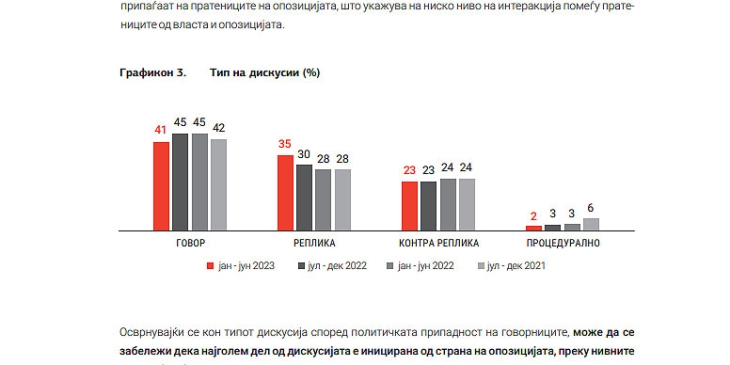IDSCS monitoring report notes relatively low level of debate in Parliament
- In its latest Parliament Watch: Monitoring report on the debate quality in the Assembly, the Institute for Democracy "Societas Civilis" - Skopje (IDSCS) notes a relatively low level of debate quality in the Assembly. The monitoring focused on discussions related to parliamentary agenda items that fall into areas such as rule of law, human rights, and democracy.

Skopje, 31 August 2023 (MIA) - In its latest Parliament Watch: Monitoring report on the debate quality in the Assembly, the Institute for Democracy "Societas Civilis" - Skopje (IDSCS) notes a relatively low level of debate quality in the Assembly. The monitoring focused on discussions related to parliamentary agenda items that fall into areas such as rule of law, human rights, and democracy.
MPs from the opposition were more active in participating in discussions, participating in 76% of all discussions monitored, while MPs from the parliamentary majority participated in 24%.
MPs who stayed the longest at the parliamentary rostrum are Dayancho Eftimov, Zdravko Trajanov and Beti StamenkoskaTrajkoska. In terms of how many times they spoke, the most active MP is Zdravko Trajanov who spoke 85 times, MPs Dayancho Eftimov and Bojan Stojanoski with 70 times and Lidija Petkoska with 59 times.
The share of women in the discussion is at a high 43%, and remains at a relatively high level, and this is the highest participation of women in the discussion compared to
previously observed mandates.

"The score for discourse quality for the period from January to June 2023, on a scale from 1 to 10, is 5.5, which indicates a slight deterioration in debate quality compared to the period from July to December 2022, for which the discourse quality score was 5.7," reads the IDSCS report covering the period from January to June 2023.
The report shows relatively low level of debate quality in the Assembly in this mandate and concludes that there is room for significant improvement.
"The level of argumentation has slightly deteriorated compared to the previous monitoring period from July to December 2022. In 49% of the analyzed discussions, the participants had no arguments, while in 44% of the analyzed discussions they had a poor argumentation. In only 7% of the monitored discussions the speakers used one argument to explain their position, which is almost at the same level compared to the previous period. Only eight speakers used two arguments, while in the monitored discussions, speakers used more than two arguments to support their position in only two instances or in only 0.1% of the monitored speeches," says IDSCS.
In only 11% of observed discussions, MPs used facts from research, experience, documents and other relevant sources as part of their reasoning, thus confirming the general low level of argumentation.
"In this reporting period, no change of attitude was observed among the MPs due to better arguments of the interlocutors or any other reason in the discussions monitored, which is on the same level as the last monitoring period from July to December 2022," the Institute says.
When it comes to the attitude of MPs towards the personality of their colleagues from another political party, respect was shown in 3% of the discussion, which indicates a significant decline compared to the previous monitoring period when respect was
shown in 17% of cases.
The report also confirms the consistently low regard of the MPs towards the rights of marginalized groups, consistent in all periods of monitoring. It has been observed that in almost 87.3% of their discussion, the MPs do not refer to the rights of marginalized groups, unless a specific law or agenda topic related to their rights is discussed.
Since June 2014, IDSCS monitors the debate quality in the Assembly and the media coverage of the work of the Assembly. Since January 2020, the Institute for Democracy has been monitoring the work of the Assembly and the debate quality within the framework of the Parliamentary Support Program (PSP), funded by the Government of Switzerland and implemented by the National Democratic Institute (NDI), the Institute for Democracy “Societas Civilis” - Skopje (IDSCS) and the Center for Change Management
(CCM). The content of the publication can in no way be considered to reflect the views of the Government of Switzerland.
Photo: Printscreen







